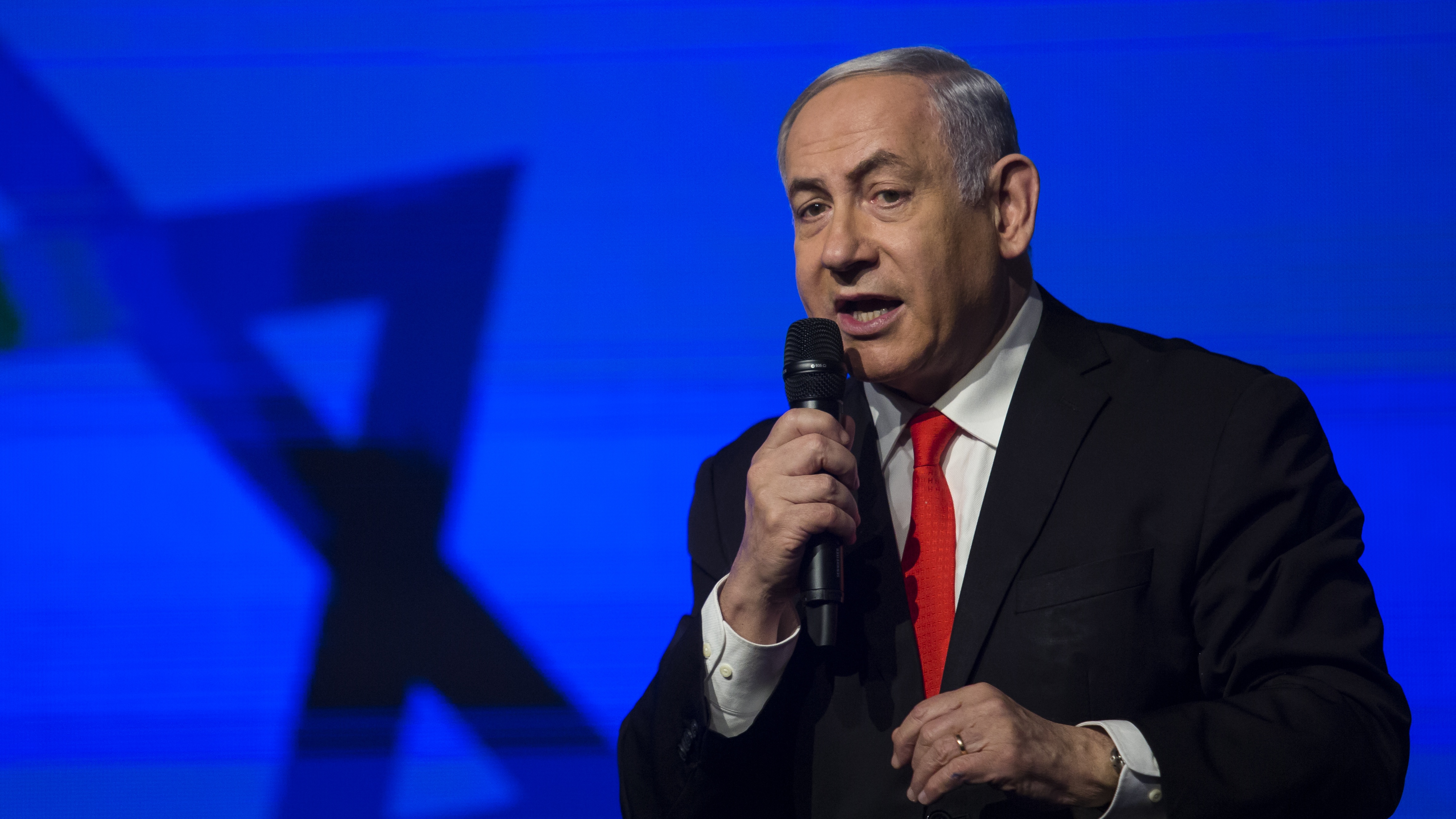Benjamin Netanyahu battling to ‘split coalition’ in fight for political survival
Eight opposition parties trying to seal deal that would oust Israel’s longest-serving leader

A free daily email with the biggest news stories of the day – and the best features from TheWeek.com
You are now subscribed
Your newsletter sign-up was successful
Benjamin Netanyahu is ramping up pressure on right-wing MPs from the various parties negotiating the formation of a coalition that could end his 12 years in power.
Eight opposition parties are involved in talks to form a coalition with a majority of one in the Knesset, but with the formation of a government resting on such a small majority, “any defection could give the prime minister a lifeline”, The Times says.
After talks initially appeared to have stalled, negotiations have been running round the clock since former Netanyahu ally turned enemy Naftali Bennett announced that his right-wing Yamina party was prepared to consider a coalition deal.
The Week
Escape your echo chamber. Get the facts behind the news, plus analysis from multiple perspectives.

Sign up for The Week's Free Newsletters
From our morning news briefing to a weekly Good News Newsletter, get the best of The Week delivered directly to your inbox.
From our morning news briefing to a weekly Good News Newsletter, get the best of The Week delivered directly to your inbox.
Bennett “will be the country’s next prime minister under a proposed power-sharing deal”, The Guardian reports, with Yair Lapid, the chairman of Yesh Atid, the main opposition party in the Knesset, saying that a new government could be formed in days.
“We can end this next week,” Lapid said in a speech on Monday. “In a week the state of Israel can be in a new era with a different prime minister.”
A source in Lapid’s party told The Guardian that “the deal would lead to Bennett becoming prime minister first”, replacing his ex-ally Netanyahu, then “later handing power to Lapid”. The details of “how they would split a four-year term was not final”, the source added.
Following four elections in two years, all of which failed to deliver a parliamentary majority for any one party, Netanyahu is for the first time facing “a group large enough to have an impact” that appears able to “overcome its ideological differences” and “co-operate in removing him from office”, The Times reports.
A free daily email with the biggest news stories of the day – and the best features from TheWeek.com
“The main stumbling block” in agreeing a coalition arrangement “is the distribution of cabinet posts”, the paper adds, with the agricultural brief – “a useful vote-getter with the farming lobby” – prompting disagreements between various factions.
Meanwhile, members of the coalition talks are coming under increasing pressure from Netanyahu and his supporters, with the Israel Security Agency, known as the Shin Bet, ordering security at the “nearly highest level for Bennett”, Haaretz reports.
Police will “intensify patrols” around the homes of both Bennett and Ayelet Shaked, a highly influential member of the Knesset, the paper adds, while “both will have permanent security guards based in their homes”.
Both have had “threats to their lives”, The Times says, after “Netanyahu’s Likud party put up giant posters on an office block in Jerusalem” showing the faces of Bennett, Shaked and Gideon Saar, a former minister in Netanyahu’s party who is now leader of another right-wing party set to join the coalition.
The poster accused the trio of entering coalition negotiations with “supporters of terrorism”, with the slogan: “The right wing will not forgive you.”
Netanyahu will not “leave his official residence in Jerusalem without a fight”, writes Anshel Pfeffer on CNN, noting that while “he may have lost any prospect of mustering a majority of his own” he is “exerting every ounce of pressure on wavering members of the opposition”.
His party is working “to amplify the toxic social-media campaigns against Bennett and members of his Yamina party”, Pfeffer adds, suggesting that “even if they succeed in keeping their coalition together and Bennett is sworn in as Israel's next prime minister, Netanyahu is going nowhere”.
-
 How the FCC’s ‘equal time’ rule works
How the FCC’s ‘equal time’ rule worksIn the Spotlight The law is at the heart of the Colbert-CBS conflict
-
 What is the endgame in the DHS shutdown?
What is the endgame in the DHS shutdown?Today’s Big Question Democrats want to rein in ICE’s immigration crackdown
-
 ‘Poor time management isn’t just an inconvenience’
‘Poor time management isn’t just an inconvenience’Instant Opinion Opinion, comment and editorials of the day
-
 Epstein files topple law CEO, roil UK government
Epstein files topple law CEO, roil UK governmentSpeed Read Peter Mandelson, Britain’s former ambassador to the US, is caught up in the scandal
-
 Iran and US prepare to meet after skirmishes
Iran and US prepare to meet after skirmishesSpeed Read The incident comes amid heightened tensions in the Middle East
-
 Israel retrieves final hostage’s body from Gaza
Israel retrieves final hostage’s body from GazaSpeed Read The 24-year-old police officer was killed during the initial Hamas attack
-
 China’s Xi targets top general in growing purge
China’s Xi targets top general in growing purgeSpeed Read Zhang Youxia is being investigated over ‘grave violations’ of the law
-
 Panama and Canada are negotiating over a crucial copper mine
Panama and Canada are negotiating over a crucial copper mineIn the Spotlight Panama is set to make a final decision on the mine this summer
-
 Why Greenland’s natural resources are nearly impossible to mine
Why Greenland’s natural resources are nearly impossible to mineThe Explainer The country’s natural landscape makes the task extremely difficult
-
 Iran cuts internet as protests escalate
Iran cuts internet as protests escalateSpeed Reada Government buildings across the country have been set on fire
-
 US nabs ‘shadow’ tanker claimed by Russia
US nabs ‘shadow’ tanker claimed by RussiaSpeed Read The ship was one of two vessels seized by the US military